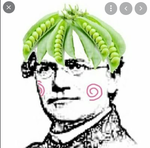
I enjoy Boston as a city, but traveling to other cities is a good reminder of how petite a city it is. Case in point: Chicago. Particularly if you transit by air on a clear night, the enormous nature of the city becomes apparent, reinforced by the Jeffersonian grid of streets.
The size difference extends to some public institutions as well. Boston's Museum of Science is a very good museum, but Chicago splits the same subject matter into three institutions, two of which (Museum of Science & Industry and the Field Museum) are almost certainly larger than the MoS (I've never made it to the Adler Planetarium, so I can't make the comparison there).
Some overlap is to be expected, and so both the MoS&I and the Field have exhibits on genetics. We only dashed through the one at the MoS&I as a shortcut, though I did catch a glimpse of a former Millennium colleague in one of the videos. But the Field's exhibit on Brother Gregor, well that could not be skipped.
The exhibit covers the life and impact of Gregor Mendel, the monk who trained extensively in science but never received a degree there. His pioneering work might never had happened, except he was a failure as a ministering cleric. Among its revelations for me was his extensive efforts in other sciences, such as astronomy. I also had not heard that Mendel had, near the end of his life, been confident that his work had not been in vain. We can also see an all-too-common story in his life: ultimately his scientific efforts were cut off by administrative duties, as he finished his career as abbot of the monastery.
The exhibit had a nice mix of modern elements, reconstructions, and actual artifacts. For the latter, one example was his microscope & slide set! A box with 5K peas (if I remember correctly) showed just how many peas he scored -- in only the first year of experiments! Various computer games attempt to capture the attention of the modern set, such as the genetics project I have had running for seven years. There are also the juicy personal tidbits, such as his habit of throwing dried peas at sleeping students! One other point brought out by the exhibit: how Mendel was a pioneer of combining math with biology.
Like any good exhibit, I found myself leaving with many unanswered questions -- not because the exhibit wasn't well designed, but because it had stoked my curiosity. For example, it mentioned that Francis Galton had performed similar lines of inquiry, which perhaps made him very receptive to Mendel's work once it had been rediscovered. There was also a brief mention of the three scientists who rediscovered Mendel's work. What was truly similar and what was distinct in these five efforts?
The exhibit also touched on, but in very minimal form, the controversy over whether Mendel's numbers were too good. Did he trim his data, or is there some biology going on there? It didn't seem to point out Mendel's luck: he picked seven traits which are unlinked (I think two are very loosely linked, detectable but not easily). Would he have stumbled if two traits had proved partially linked?
Another point to ponder: Mendel published his work in the lowly local journal, but he attempted through correspondence to spread the word further. The exhibit mentions a prominent botanist who politely knocked down Mendel's suggestions, but alas didn't translate the letters (some are on display). A fascinating historical question is who did read Mendel's books: perhaps a check of the lending records of the libraries that received them would be informative (Boston's Public Library is reputedly one; one day I'll try to do this).
It also touched on two of the unpleasant 20th century genetics episodes: Eugenics & Lysenko. The eugenics section notes Galton's fascination with the subject and presents a chilling Nazi poster decrying the resources spent on someone with a genetic 'sickness'. The Lysenko panel notes his impact on Soviet science, the grim penalties for supporting Mendel during Lysenko's reign & the fact that only after Lysenko's death was a commemorative plaque placed at Mendel's monastery.
The exhibit will be at the Field until April, and will then tour a number of other museums (schedule). The tour seems somewhat geographically restricted: nowhere west of the Mississippi. If you can get to it, do so -- you won't be sorry!
No comments:
Post a Comment